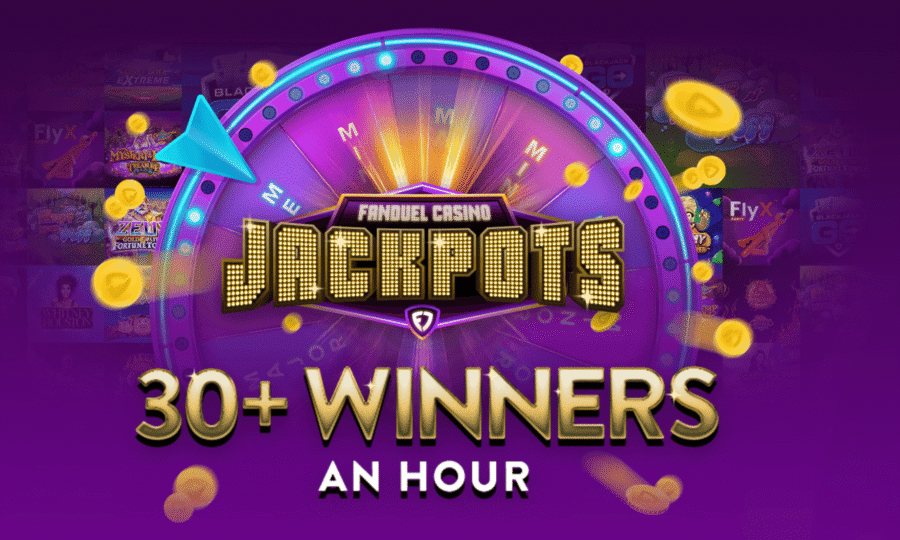FanDuel Casino Jackpots feature gives players opportunities to double winnings

FanDuel on Tuesday announced the launch of its FanDuel Casino Jackpots feature, giving players the opportunity to double their chances of winning a jackpot on eligible games by increasing their contribution to US$0.20 after opting-in to FanDuel Casino Jackpots.
The feature is available to players in Michigan, New Jersey, and Pennsylvania and on a wide range of top and exclusive games. FanDuel Casino players can still opt in at a lower price of US$0.10, giving them flexibility and control over how much they contribute per bet.
“At FanDuel Casino, our goal is to deliver the ultimate winning experience,” FanDuel Casino Commercial Vice President James Davison said in a statement. “With the introduction of this new jackpot feature, we’re creating even more opportunities for players to win. This exciting addition gives our players the chance to double their play for even bigger prizes, reinforcing our commitment to offering the most rewarding casino experience every day.”
FanDuel Casino Jackpots, launched in April to all customers, introduced a progressive jackpot system designed to deliver more wins to more players. FanDuel Casino Jackpots allows players to opt in and add US$0.10 to each wager for the opportunity to win one of four jackpots: Mini, Minor, Major, or Mega.
With the debut of the feature, players can double their chances of winning by adding US$0.20 per wager vs. US$0.10. Since its launch this year, more than 450,000 jackpots have been won totaling more than US$300 million.
In a news release, it was stated that FanDuel Casino’s acquisition of player engagement specialist BeyondPlay in February 2024 was crucial in launching its new Jackpots feature. By leveraging the expertise of the BeyondPlay team, FanDuel Casino has strengthened its customer experience and delivered its jackpot technology to customers.
Verticals:
Sectors:
Topics:
Dig Deeper
The Backstory
Why this matters now
FanDuel’s latest enhancement to its in-house progressive network aims to solve a familiar challenge in regulated online casinos: converting casual play into sustained engagement. Earlier this year the operator stitched together a multi-tier progressive system spanning eligible slots and table titles in Michigan, New Jersey and Pennsylvania, letting users opt in for an extra 10 cents per spin or hand for a shot at Mini, Minor, Major and Mega prizes. That framework, detailed when FanDuel’s Casino Jackpots went live in three states, set the groundwork for an incremental upsell. The new twist doubles a player’s jackpot chance when the opt-in contribution rises to 20 cents, a small price jump designed to compound participation without materially altering base wagers.
The strategy leans on FanDuel’s acquisition of engagement specialist BeyondPlay in 2024, which brought jackpot orchestration technology and personalization tools in-house. That buy, cited as instrumental in the three-state launch, supports faster iteration on prize seeding, hit frequency and game coverage. The higher opt-in tier gives FanDuel a new lever to manage liquidity and headline wins while testing elasticity: how many users will pay a bit more for a better shot at a payout, and how often will they do it across sessions and titles?
Progressive jackpots are a proven acquisition channel, but they also function as retention infrastructure. Bigger pools and frequent hits keep players circulating between games and returning across days. By letting users control their contribution level, FanDuel is tailoring the product to appeal to both jackpot-chasers and everyday grinders who value predictable spend and steady entertainment.
From one-off promos to persistent features
FanDuel has used high-attention sports windows to train customers on flexible betting mechanics, then port the behavior into everyday play. In March, the company rolled out a Bet Back Token during March Madness, giving sportsbook users a way to hedge poorly performing parlays with bonus bets and to combine picks across multiple rounds. The point was not just bracket season buzz. It normalized opt-in utility features that trade a small cost or condition for a perceived safety net or upside. The jackpots contribution follows that playbook on the casino side: clear optionality, visible value and recurring use cases.
For operators, persistent features outperform episodic promotions. Tokens expire, odds boosts rotate and seasonal bonuses fade. A visible progressive meter and a tap-to-opt-in toggle sit inside the core game loop, encouraging habitual engagement. As FanDuel expands eligible titles, the feature can become a default behavior for a meaningful slice of the audience, particularly if hit frequency on lower-tier progressives stays high enough to generate social proof in app.
A crowded race for headline wins
The competitive bar keeps rising. Rival BetMGM has built its brand around exclusives and jackpots that can dominate state leaderboards. It reported more than $128 million in progressive payouts in 2024, including record jackpots by state, underscoring the draw of large, frequent wins across a broad portfolio. The operator outlined the scale and mix in its progressive jackpot update, noting thousands of games and a state-by-state network that still generates national-caliber headlines.
That arms race matters because U.S. iGaming remains fragmented. Operators cannot pool casino liquidity across state lines, so each market needs its own momentum. A feature that nudges many players to contribute a bit more per wager can thicken prize pools faster, keep meters moving and deliver the kind of daily win cadence that sustains top-of-app placement. FanDuel’s ability to calibrate hit rates and communicate value inside the lobby will be central to challenging incumbents in jackpot-heavy markets such as New Jersey and Michigan.
The differentiation will not hinge on jackpots alone. Exclusive content, brand IP and mechanics tailored to mobile session lengths all shape how often customers encounter opt-in prompts and how compelling the offer feels in the moment. Still, progressive systems are one of the few product levers that can simultaneously satisfy headline marketing and in-session retention.
Content pipelines and omnichannel pull
A richer jackpot layer is more effective when it sits atop a broad, recognizable game library. That puts a premium on content pipelines and omnichannel crossovers. White Hat Studios, one of the fastest risers in U.S. casino content by gross gaming revenue this year, announced a move into retail via a distribution pact with Gaming Arts, pointing to two-way traffic between land-based and online catalogs. The company framed it as an entry into omnichannel distribution in its Gaming Arts deal announcement, with titles like Big Catch Bass Fishing already in the field and more on the way.
For FanDuel and peers, that trend creates more candidates for progressive enablement and co-marketing. Popular retail titles that migrate online often come with built-in brand equity, which can accelerate opt-in adoption to jackpots if the mechanic is integrated at launch. Conversely, online-native mechanics such as multi-tier progressives can inform the next generation of cabinet games, reinforcing familiarity as players move between channels.
Expect more operators to tie jackpot features to exclusive or first-to-market titles. That pairing can drive early momentum in new-state launches and motivate suppliers to prioritize integrations that showcase progressive overlays.
Taxes and the cost of engagement
The economics of progressive ecosystems depend on contribution rates, takeouts and promotional budgets, all of which can be pressured by shifting tax policy. Lawmakers in Wyoming have floated a move to double the online sports wagering tax to 20 percent, arguing the current 10 percent is low relative to neighbors. The proposal, discussed at a June committee meeting, highlights a broader pattern: states revisiting rates as markets mature. The debate and rationale were laid out in coverage of Wyoming’s draft bill.
While the draft targets sportsbooks, higher effective tax burdens or compliance costs in any vertical can force operators to reassess promotions and product subsidies across the wallet. Louisiana advanced a sports betting tax increase this year, reinforcing the direction of travel. If tax creep continues, operators may lean harder on features that encourage user-paid value, such as jackpot contributions, rather than on house-funded bonuses. That makes the performance of a 20-cent opt-in—and customer tolerance for it—more consequential to bottom lines.
What to watch next
Key signals will come from opt-in adoption at the higher contribution, the distribution of wins across jackpot tiers and churn among price-sensitive segments. Watch for FanDuel to expand the eligible game roster, mix in exclusives and adjust hit rates to balance frequent smaller wins with headline Mega payouts. Competitive responses may include higher-seeded progressives, cross-vertical tie-ins and new retention tools that mimic the opt-in-for-upside structure seen during March Madness via Bet Back Tokens.
The stakes are straightforward: in a state-by-state iGaming landscape where marketing is expensive and content gaps narrow quickly, a durable, user-funded jackpot layer can become a cornerstone of unit economics. The next few quarters will show whether a small increase in contribution can materially widen the pool and deliver the win cadence needed to keep players opted in.








